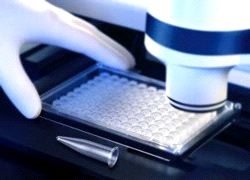Consumables
On the occasion of FAKUMA, October 14th to 18th in Friedrichshafen, Germany

Tuesday 14. October 2008 - Luran HD joins the product line for medical technology plastics
As of August 1st, BASF has added another plastic specialty for the medical technology sector to its product range: Luran HD is the first SAN (styrene-acrylonitrile copolymer) to be offered along with BASFs HD services. HD stands for Healthcare and Diagnostics. In comparison to other transparent materials, Luran is more resistant to chemicals, stiffer, easier to process and offers high resistance to fluctuations in temperature. This material is already available in commercial quantities.
“The market for plastics in medical technology is growing and now it can turn to Luran HD, a thermally stable, transparent product that lends itself very well, for instance, for specimen holders used in large-scale experiments, urine containers, vacuum bottles or nebulizer housings,” explains Thomas Wiles, who is in charge of BASFs HD brands. The new material can be sterilised with beta/gamma radiation, it is microwave-stable and moreover less expensive than other transparent plastics like PMMA or PC.
Enlarged portfolio: four products for medical technology
The transparent plastic Luran HD has now joined two styrene copolymers and the polyoxymethylene that make up BASFs existing product line of plastics for medical technology. Whereas Terluran HD (ABS) offers a very good balance between toughness and stiffness Terlux HD (MABS) stands out for its combination of transparency and impact-resistance. The engineering plastic Ultraform PRO (POM) is capable of withstanding high mechanical loads and exhibits good sliding-friction properties.
The service package for medical technology: reliability and compatibility
As is already the case with the existing HD brands, BASF is now also offering Luran HD in combination with a comprehensive service package especially adapted to the requirements of this market. This service package encompasses not only technical support for applications, compatibility tests with specific chemicals and biocompatibility tests (e.g. according to United States Pharmacopoeia and ISO 10993-5), but also the creation of so-called drug master files (DMF). Moreover, BASF expresses its intent not to change the plastic formulation. The realm of medical technology derives a great benefit from this service since a stable formulation reduces the risk that manufacturers of medical equip¬ment will have to obtain costly new approvals. The tests conducted by BASF and the approvals also translate into simplified testing and permit procedures for users.
